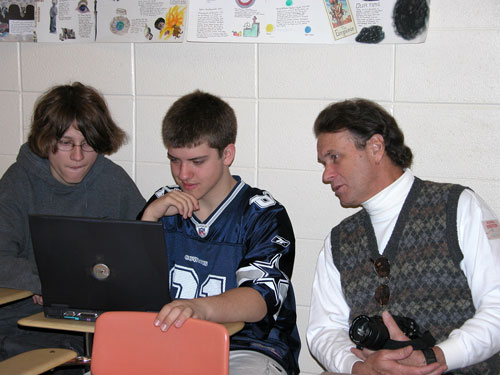|
Making
it Public |
|
|
Mike and Dave explain their project to our guest, Ted Nellen. Ted's view gave the students more to think about. |
|
|
"Writing on a web
page . . . makes you want to write better
Making it public: Making student work public via web pages is the key point of CyberEnglish. We talk about a real audience and it soon becomes clear to students that other people besides me really are checking out their sites. This changes everything for them. It makes them conscious of writing in ways they never were before. Making it public also refers to the way the class is taught. Almost every document used for this class is published on our class web site. Unit plans are clearly defined. The semester calendar details what goes on each day and includes due dates. Students can print out copies of handouts, lessons, etc., which is especially helpful if they were absent or lost the original. Making course materials public in this way empowers students and parents. Nothing is secret--locked in a file cabinet somewhere. It is open. Having a public audience is good for teachers, too. I find myself continuously thinking about what I publish on the web through my students' and parents' perspective, and I have made careful revisions over the years. CyberEnglish is Fun: CyberEnglish is fun English. There are few students who donít like being on computers. Just getting that positive emotional connection to learning in English is incredibly subversive. Brain gurus say kids wonít learn anything if they hate being in class, hate reading, and hate writing. I have to say that since I began CyberEnglish, I have not had the whining and the negativity. On the contrary, students are generally enthusiastic, on task, and concerned with quality. CyberEnglish has made a big difference in many ways, and I think it comes from the perception that it is a fun class. (from English Journal, November 2004) The perception of fun is only the portal. What we accomplish with computers is what makes CyberEnglish fun for the teacher. Ted said that the Internet makes it easier for peers to view and comment on each otherís works, and it is true. My students peer edit their writing and their Web-page designs. Presentation is a skill that we can really work on in CyberEnglish. The only real variety in presentation for paper text is font. On the Web, students have so many more choices about color and graphics. Even the way writing looks is more fun. (from English Journal, November 2004) Choices: Technology allows me to structure my curriculum so that individual choice is really important. And using Web pages, computers, and other technology simply forces us all to think differently. When students are expected to make choices in reading, writing, Web design, and more, they come to value the results of their choices. The work they publish is truly theirs. I was concerned about a lack of voice in student writing, but now that what they write is more up to them than me, I hear their voices loud and clear. (from English Journal, November 2004) The more choices my students make, the better. I think CyberEnglish teachers view students as real writers in the sense that we expect students to make conscious choices about subject, mode, style, and presentation for a real-world audience. (from English Journal, November 2004) Links:
|
|
